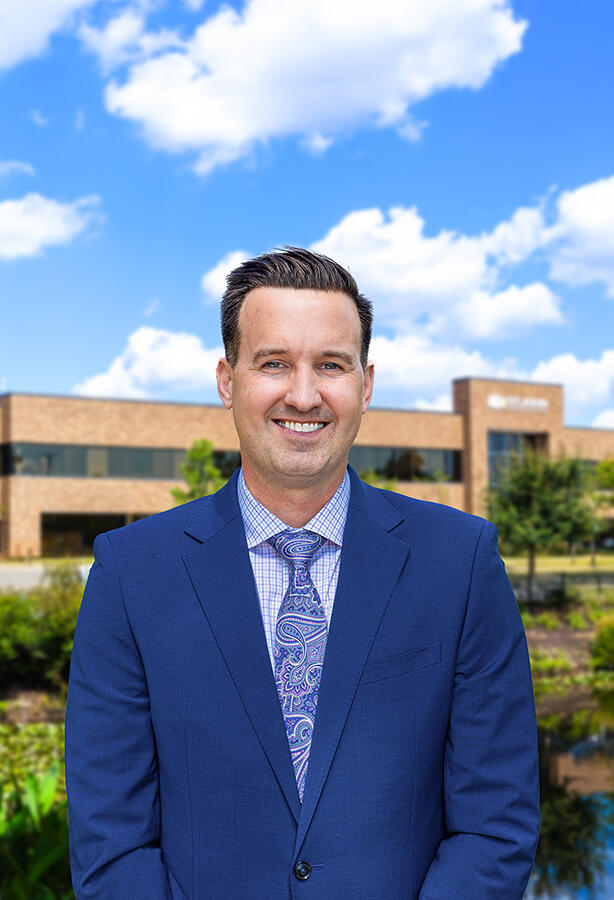Brett Foelber ’08 honored among Baltimore Business Journal’s 40 Under 40
Brett Foelber ’08 is an assistant vice president for marketing at St. John Properties, where he has worked since 2021 and previously served as director of marketing. Foelber and his fellow 40 Under 40 honorees were selected by the Baltimore Business Journal for their significant contributions to not only their workplaces but also within their communities.

Brett Foelber ’08 (third from right) in 2024 with colleagues at the site of Westinghouse Crossing, St. John Properties, Inc.’s first property in Texas. Foelber is among the Baltimore Business Journal’s 40 Under 40 honorees for 2025.

Brett Foelber ’08
Brett Foelber ’08 admits that when he started college at Randolph-Macon College, he really had no idea what his career path would be. He gave Computer Science a try but “It didn’t take long to realize that spending all my time coding and buried in advanced math wasn’t the best fit for me.”
When he transferred to McDaniel College for his junior year, he discovered the Communication & Cinema Department and found his home. “It just clicked,” he says. “I knew I’d finally found the right place to blend creativity, communication, and strategy — and that decision truly shaped the rest of my career.”
Since graduation, Foelber has worked on the corporate side of retail, and most recently, commercial real estate. From his first role as a marketing coordinator at ESCO Ltd. to his current role as assistant vice president of marketing at St. John Properties, Inc., Foelber has kept the lessons he learned as a Communication major on the Hill close. And they’ve paid off with being named to the Baltimore Business Journal’s 2025 40 Under 40 list.
“I’m incredibly honored and humbled to be recognized as one of the Baltimore Business Journal’s 2025 40 Under 40 honorees,” Foelber says. “This recognition means a great deal and should be credited not just to me, but to my family, colleagues, and mentors who have supported and shaped me along every step of my personal and professional journey.”
We spoke with Foelber about his McDaniel experience, his career, and advice for the next generation of Green Terror graduates.
What is one thing your Communication degree taught you that will always stick with you?
What’s always stayed with me from my Communication degree at McDaniel is how versatile it is — the doors it can open across so many industries and roles, from sales to public relations, to digital and social media, marketing and beyond. That flexibility has been invaluable throughout my career as I’ve changed positions and industries.
More than anything, though, McDaniel taught me how to problem solve. No matter the company or position, challenges will always come up. The ability to think critically, adapt, and find solutions has been one of the most important skills I carry with me to this day.
Who were some of your faculty mentors on the Hill?
I was fortunate to have several mentors at McDaniel who left a lasting impact on me. Dr. Deborah Vance was one of the first people I met — she guided me through the process and helped chart a path that allowed me to graduate on time, even when some of my credits didn’t transfer. Her support and encouragement meant a lot during that transition.
I also really enjoyed classes with Professor Jonathan Slade, whose background as a cinematographer made his video production courses both inspiring and hands-on. I still remember producing weekly campus news broadcasts across campus. Dr. Bob Trader, who started at McDaniel the same year I transferred, also had a lasting influence with his insights on the psychology of communication and connecting with different audiences.
Beyond the classroom, Kevin Selby — our assistant men’s basketball coach — provided incredible leadership and support during a difficult time when our head coach, Bob Flynn, passed away unexpectedly mid-season. And the late women’s basketball head coach Becky Martin was another tremendous influence whose positivity and strength left an impression on everyone she met.
What experiential learning opportunities did you participate in?
I was fortunate to take part in several meaningful courses and internships that set me up for success early in my career. One of my internships was under Becky Martin. I used my marketing and design skills to create promotional materials for the women’s basketball team’s upcoming summer basketball camp. I also assisted with recruiting efforts — helping send letters and research potential players. It was an early lesson in how communication and strategy intersect in real-world settings.
I also interned with Dr. Trader, assisting with research on colleges and universities offering master’s programs in Communication. That project became a valuable resource for both students interested in pursuing graduate degrees and faculty guiding them toward the right opportunities.
What was the best part of your McDaniel experience?
The best part of my McDaniel experience was being part of the men’s basketball team. The brotherhood we built — both on and off the court — was something truly special. We went through highs and lows together, but that shared experience created bonds that are still strong to this day.
“More than anything, though, McDaniel taught me how to problem solve. No matter the company or position, challenges will always come up. The ability to think critically, adapt, and find solutions has been one of the most important skills I carry with me to this day.”
What are the highlights of your career?
My marketing career has been an incredible journey across multiple industries and organizations, each shaping my perspective in meaningful ways. Along the way, I’ve been fortunate to receive both personal and professional recognition, and to contribute to teams and companies that have earned significant distinctions.
What do you enjoy most about your work?
What I enjoy most is connecting with people — learning their stories, understanding what motivates them, and uncovering the “why” behind their decisions. I’ve always been fascinated by the psychology of communication and how genuine curiosity can help build trust, empathy, and lasting relationships. That human connection is what continues to inspire me every day.
What motivates you to give back to your communities?
My motivation to give back to McDaniel — and to stay engaged in my professional and personal communities — really comes down to being a resource for others.
When I look back on my time on the Hill, I realize how valuable it would have been to have more access to alumni who could share their experiences, advice, and career insights. That reflection drives me to stay involved now. If I can help current students better understand the possibilities their degree can lead to or give them a bit more confidence as they take their next steps, that’s incredibly rewarding.
“My motivation to give back to McDaniel — and to stay engaged in my professional and personal communities — really comes down to being a resource for others.”
What advice would you give to current students who are interested in a marketing career?
Graduating in the middle of the 2008 recession taught me an important lesson: even with a strong degree, your education is just the beginning. I came out eager to make an immediate impact, but quickly realized how vast and ever-changing the fields of marketing, advertising, and communications really are. There’s always more to learn.
My biggest advice is to immerse yourself in your company or organization — learn its goals, values, and definition of success. Understand who the decision-makers are and how your role contributes to the bigger picture. That understanding will make you not only more effective but also a trusted and valued member of the team.
A few pieces of advice I’ve carried with me:
- Ask questions — even the simple or “dumb” ones. Curiosity shows engagement and humility.
- Be flexible and collaborative. The best ideas often come from blending perspectives.
- Be approachable. Whether in a small business or a large corporation, people who are accessible and genuine build stronger relationships — and stronger teams.